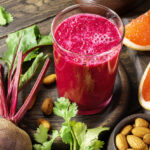“Beet” the odds: Surprising heart health benefits for postmenopausal women
 (NaturalHealth365) Beets are an underrated food rarely used in recipes because of their bland taste and appearance. Beets are out of sight at most restaurants and supermarkets, so they are also out of mind.
(NaturalHealth365) Beets are an underrated food rarely used in recipes because of their bland taste and appearance. Beets are out of sight at most restaurants and supermarkets, so they are also out of mind.
However, a new study published in Frontiers in Nutrition highlights the merits of this vegetable, particularly for heart health in postmenopausal women.
Postmenopausal women take note: Beets support heart health
Juiced beets stimulate healthy blood circulation in women who’ve reached menopausal age. This finding, made by researchers at Penn State, is important as the chances of heart disease significantly increase after women reach menopause as estrogen levels decline. Estrogen is a hormone that helps maintain optimal cholesterol levels while simultaneously performing additional functions that shield the heart.
A group of interdisciplinary researchers conducted the study, which included 24 women between the ages of 50 and 60. The Penn State team tested the study participants’ vascular function before consuming two 2-ounce servings of beetroot juice. Each participant consumed one bottle of juice every morning for the following week. The nitrate content in the juice was equivalent to what you’d find in three beets. After several weeks, the participants were given beetroot juice without nitrates for comparison.
The study was conducted in a “blind” manner, ensuring that neither the researchers nor participants knew which juice was consumed at each stage. The results showed that beetroot juice rich in nitrates significantly improved blood vessel dilation compared to nitrate-free juice. An ultrasound sensor and stress tests were used to measure blood flow and vessel response, highlighting the positive effects of nitrate-rich beetroot juice on cardiovascular health.
Frequent beetroot juice consumption improves blood vessels and heart health
For beetroot to truly benefit your blood vessels and heart, you need to drink it regularly. Occasionally sipping on it just won’t cut it. The real power of beetroot juice lies in its high nitrate content, which is what really gives your cardiovascular health a boost.
Once ingested, the body converts nitrate into nitric oxide, which helps blood vessels relax and widen, promoting better blood circulation. This process is particularly crucial during times of reduced blood flow and oxygen supply, such as during a heart attack, where the delivery of oxygen and blood flow are critically compromised.
Tap into beets’ often overlooked cardiovascular benefits
Although beets aren’t particular palate-pleasers and have little visual appeal, they are potential heart-savers. Organically grow your own beets in your yard or buy organic beets from a store or farmer’s market, and you’ll do your heart a favor.
Organic beetroots are a better pick compared to those grown with pesticides. Why? Aside from avoiding the chemicals used in conventional farming, organic beets naturally absorb more nitrates from the soil, which is great for your health.
Conventional beets are often heavily sprayed with pesticides, affecting their nitrate content and potentially leaving harmful residues. Organic farming skips these sprays, ensuring that your beets – and other produce – are cleaner and richer in nutrients. Plus, you can get nitrates from organic greens like lettuce and spinach, so you have various healthy options.
Beets have a simple flavor, making them tricky to use in recipes. But when paired with the right ingredients, they can really shine. Add roasted beets to a hearty lentil stew or mix them into a salad with walnuts. If you’re unsure, roasting beets with a drizzle of balsamic glaze makes for a delicious and versatile side dish.
Sources for this article include:



